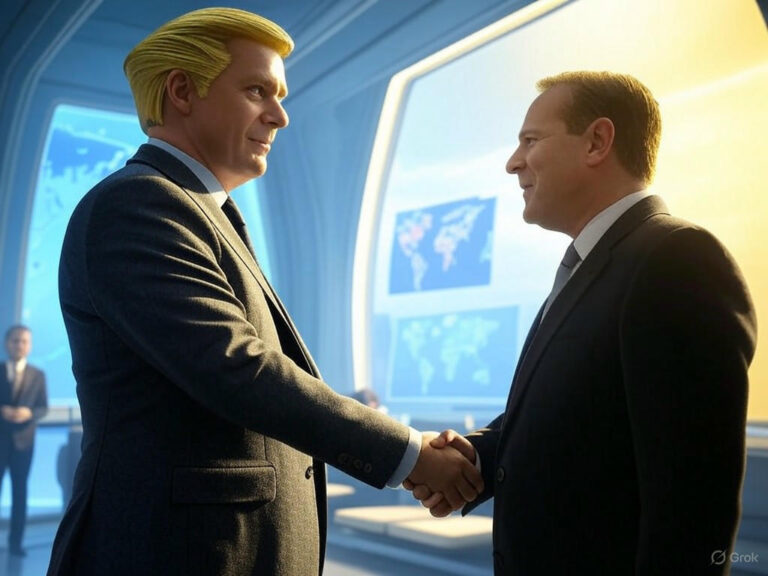
Trump Foreign Film Tariffs: No Final Decisions Announced Yet
The Buzz Around Trump Film Tariffs and Global Cinema
The global film industry is buzzing with uncertainty after President Donald Trump floated the idea of imposing 100% tariffs on movies made outside the United States. These potential Trump film tariffs could upend decades of international collaboration, with Trump describing foreign films as products of “foreign lands” in his announcement. But hold on—White House spokesperson Kush Desai has clarified that no final decisions are set in stone, emphasizing that the administration is still exploring options to protect U.S. economic security and “Make Hollywood Great Again.”
This development highlights how trade policies can ripple through creative sectors, affecting everything from blockbuster budgets to indie productions. If you’re a film enthusiast or professional, you might be wondering: Could this mean higher ticket prices or fewer international hits in U.S. theaters? Let’s break it down step by step.
Understanding the Proposed Trump Film Tariffs
President Trump has signaled plans to collaborate with the Department of Commerce and the U.S. Trade Representative to roll out these tariffs “immediately,” which would essentially double the cost of importing foreign films. This approach treats films as tradable goods, even though experts argue they’re more about intellectual property than physical products. The ambiguity around how Trump film tariffs might be enforced is what’s got everyone on edge—it’s uncharted territory in international trade.
Imagine a world where your favorite British or Korean blockbuster suddenly costs studios twice as much to bring stateside; that could lead to delays or cancellations. Financial analysts from major institutions suggest this isn’t just a minor tweak—it’s a potential game-changer for how Hollywood operates globally.
International Backlash and Industry Worries
How the British Film Scene is Reacting to These Tariffs
Over in the UK, the reaction to possible Trump film tariffs has been swift and concerned. The British Film Institute (BFI) is stressing the importance of keeping collaborations alive, working closely with the UK government and U.S. partners to understand the full scope of the proposal. They’ve made it clear they want to remain a “constructive partner” in the industry, highlighting how intertwined British and American filmmaking has become.
Adrian Wootton, from the British Film Commission, echoed this sentiment, calling the news “concerning” but urging caution until more details emerge. It’s a reminder that policies like these don’t just affect governments—they hit real people, like the crews and actors who’ve built careers on cross-border projects.
The Bigger Picture: Economic and Creative Fallout
Analysts like Claire Enders from London have labeled these potential tariffs as “beyond devastating,” pointing out how vital film services are to the UK’s economy. We’ve been making movies together for over a century, so why rock the boat now? Caroline Dinenage, a UK parliament member, added that this could backfire on American businesses, which have invested heavily in UK talent and facilities for massive returns.
Financial experts at Barclays recommend studios might just hit pause on projects rather than relocate overnight—it’s a wait-and-see game. What if this leads to a slowdown in global storytelling? As a viewer, you might miss out on diverse films that bring fresh perspectives to the screen.
Ripples in Global Film Production from Trump Film Tariffs
Shaking Up Long-Standing Production Ties
If Trump film tariffs become reality, they could disrupt the deep-rooted partnerships between U.S. studios and international hubs like the UK. Think about it: Many Hollywood hits are filmed abroad for access to unique locations, skilled crews, and tax breaks—tariffs could make that math no longer add up. We’re talking about a century of creative synergy that’s fueled blockbusters and fostered cultural exchange.
A hypothetical scenario: Your next Marvel movie, shot in part at Pinewood Studios, gets hit with extra costs. Studios might rethink their strategies, potentially shifting focus back to domestic production and limiting the global flair we’ve come to love.
Economic Waves Beyond the Spotlight
The fallout wouldn’t stop at films—it could hit local economies hard, from job losses in supporting industries like catering and tech services to quieter towns that thrive on film tourism. Regions like the UK or Canada have invested in infrastructure specifically for international shoots, so pulling back could mean widespread impacts. As an industry outsider, you might not realize how one policy change can affect so many interconnected jobs.
Here’s a tip for aspiring filmmakers: Stay informed and diversify your networks. If tariffs escalate, building relationships in multiple countries could help buffer against disruptions.
Broader Policy Ties and the ‘America First’ Angle
This Trump film tariffs proposal fits into the larger “America First” trade strategy, which has already seen tariffs on various imports. It’s part of a pattern where the administration aims to bolster domestic industries, but at what cost to global relations? The UK government has flagged this as a priority in their post-Brexit trade talks with the U.S., underscoring how entertainment can intersect with diplomacy.
Have you ever considered how trade policies shape the stories we watch? It’s a fascinating layer that shows just how political our favorite films can be.
The Industry’s Cautious Stance on Trump Film Tariffs
For now, studios are playing it safe, holding off on big decisions until there’s clearer guidance from the White House. The gap between Trump’s bold announcement and the administration’s more tempered response has left everyone guessing. In an industry where planning a film can take years, this uncertainty is like a director yelling “cut” mid-scene.
If you’re in the business, consider actionable steps like reviewing contracts or exploring U.S.-based alternatives. It’s all about adaptability in times like these.
A Look Back at U.S.-International Film Dynamics
Hollywood’s relationship with the world has evolved from dominance to deep collaboration, with films now drawing on global talent pools. But Trump film tariffs could reverse that trend, pushing back against the interconnected industry we’ve built. Remember classics like “The Third Man” or recent hits co-produced internationally? They’re products of this shared creativity.
This shift might feel like a step back, but it also sparks questions: How can we preserve global storytelling while protecting local economies?
What’s on the Horizon for These Tariffs?
Moving forward, key players will watch for formal announcements from government bodies, trade negotiations, and possible legal battles over intellectual property. International organizations are gearing up to advocate, and the industry might push for compromises. If you’re following this story, keep an eye on how these talks unfold—they could redefine film production.
- Official policy updates from U.S. agencies
- Diplomatic discussions with allies like the UK
- Advocacy from film groups to shape outcomes
- Legal reviews on tariff applications
No timeline has been shared, so patience is key. What are your thoughts—could this lead to a more innovative U.S.-centric era or stifle creativity?
Wrapping Up: The Uncertainty of Trump Film Tariffs
In the end, while Trump’s announcement has stirred up plenty of concern, the fact that no final decisions are in place means there’s still room for dialogue. The global film community is advocating for collaboration, recognizing the shared benefits of an open industry. If implemented, these tariffs could reshape how we create and consume films, but for now, it’s a waiting game.
As you reflect on this, remember that your voice matters—whether as a fan or professional, engaging in the conversation can influence change. What steps might you take if this policy moves forward? We’d love to hear your ideas in the comments below, share this post with fellow film lovers, or check out our related articles on trade and creativity for more insights.
References
[1] Screen Daily. “International industry reacts to bombshell threat of Trump tariffs on films produced outside the US.” Read more.
[2] People. “Donald Trump Announces 100% Tariff on Foreign-Made Movies.” Source link.
Trump film tariffs, foreign film tariffs, movie industry tariffs, US film industry, international film production, Trump trade policy, Hollywood tariffs, global cinema tariffs, film trade impacts, entertainment policy changes




